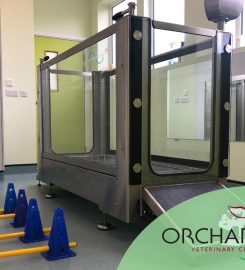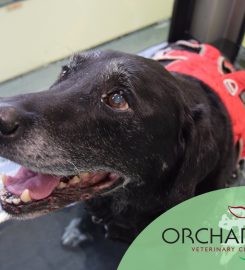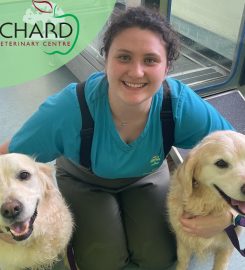Orchard Veterinary Centre
A Short History of Orchard Vets
Orchard Vets was started by vet John Dudley and vet nurse Wendy Terry in 1978. It was not that long after the James Herriot era when human and animal treatment still relied on many ancient remedies with only a few modern ones on hand. But medicine was rapidly developing and in the late 70s there was a useful, if small, selection of antibiotics, anaesthetics and other medicines which had not been available to Herriot. The years that followed have seen fantastic developments in both human and veterinary medicine, changing the face of medical care out of all recognition.
The 1970s was a time when vets were not allowed to advertise and companies were not permitted to own veterinary practices—a far cry from the situation today with half of all vet clinics run by large corporate organisations. Orchard Vets remains one of the few independent practices in the West Midlands. John is still the senior vet and Wendy is Practice Manager.
Both John and Wendy had previously worked at the RSPCA hospital in the Weoley Castle area of Birmingham. It was a time when pet ownership was sometimes a more casual affair than today. Many “latch-key” dogs were let out to roam in the mornings, not returning until the evening feed, which was usually left-over human food. So it was common to see dogs wandering the streets, often in groups, and this meant that road traffic accidents involving dogs were frequent and kept RSPCA vets busy. There were few specialist vets at that time so John and Wendy became amongst the early experts in bone and joint surgery as they had to deal with so many injuries.
Wandering dogs often strayed and became lost. It was, at that time, the responsibility of the police to deal with strays so each police station also had dog kennels. In those days, if you were an offender spending time in the cells, the barking from the kennels next door may have been an additional reason for a sleepless night! The RSPCA, funded by donations, collected the dogs from the police every day and tried to re-home them from their large kennels which were adjacent to the hospital.
Disease was another common problem. Effective vaccines were available but it was easy and cheap to own a pet and the owners of latch-key dogs would rarely pay to protect them. Consequently, canine distemper was a major endemic disease across the country. Wendy and John saw dozens of cases each day. The illness would start with cold-like symptoms, coughing and nasal discharge, which would gradually resolve over two to four weeks. Then, just as the dog seemed to have recovered, it would be hit by fits or paralysis and die.
Many of the strays entering the RSPCA kennels brought the disease with them, allowing it to spread to the other inmates. If only these dogs could be vaccinated, so much suffering could be prevented. The charity did not believe that the cost could be justified for the hundreds of thousands of dogs dealt with across the nation each year. Pharmaceutical companies were persuaded to donate vaccine and John, with two colleagues, began a clinical trial to test vaccination in the kennels. The trial was published and was so successful that many scientists round the world wanted details and the RSPCA was eventually persuaded to invest the money to vaccinate all dogs entering its kennels across the country. The result was that, within a few years, distemper almost disappeared from the UK. Now, many younger vets have never seen a case but it is held at bay only by our pets continuing to receive their regular boosters.
The Practice moved to its Church Street premises in Oldbury in the early 1980s. the building had been a hardware shop since Victorian times and still had the original window displays, counters, storage and some old stock. All of this was donated to the Black Country Museum and now forms the corner hardware shop in their main street. The Church Street site was once occupied by Oldbury’s manor house which was surrounded by orchards and Orchard Street, opposite, is still a reminder of that fact. Apples and orchards had other more personal associations for John so it seemed natural that the Practice should become Orchard Vets. The Oldbury branch moved from Church Street to new state-of-the-art premises in Birchfield Lane in 2020.
The Wednesbury branch was just a small outpost of the Practice for many years and was located in Lower High Street. The current site was purchased from Lloyds Bank in 2008 and now offers a full veterinary service in its own right. Many of the original features of this art deco building remain, including the large vaults.
After a period in the High Street the Harborne branch moved in 1996 to Home Farm, a grade II listed former farm house in the middle of the Harborne Golf Club. This site was previously the Police Dog training centre but since the mid-nineties has provided veterinary care and cat boarding from an oasis of peaceful countryside in the middle of the bustling city.
The Practice has developed a number of areas of expertise. Most of the staff have been with Orchard Vets for many years and have built a personal relationship with clients and an intimate knowledge of their needs. These are some of the reasons why, as an independent practice, Orchard Vets has become one of the foremost respected and reliable providers of veterinary care in the West Midlands.
By joining one of our rehabilitation programmes, injured or surgical patients are able to recover more quickly, and the quality of life of pets with long-term mobility problems can be improved and extended. Each animal’s plan is tailored to the individual’s needs and fitness level.
Physiotherapy and hydrotherapy are not alternative treatments, but an important part of our strategy to return pets to normal as soon as possible and will usually be used alongside the other treatments provided by our veterinary surgeons.
What is physiotherapy used for?
Conditions that can benefit from a rehabilitation plan include:
- Stiffness and pain caused by osteoarthritis
- Inherited abnormalities such as hip dysplasia
- Neurological conditions or muscular weakness
- Post-operative recovery after joint surgery or fracture repair
- Overweight patients needing to reduce weight and increase fitness
- General weakness in elderly pets or following illness
Hydrotherapy can also be useful for maintaining fitness in active or working animals.
How does it work?
Physiotherapy helps to restore normal function by building up the strength of muscles, reducing pain and increasing the range of movement.
Manual physiotherapy is hands-on manipulation and massage of the affected parts. We will show you how to continue some of these actions at home to build on the beneficial effect.
Hydrotherapy is a safe, controlled and effective treatment for pets. Our underwater treadmill is hi-tech equipment, allowing pets to exercise whilst being supported by the buoyancy of the water.
To find out more about how our Physiotherapy Unit can help your pet, give us a ring and our staff will be happy to advise.
It’s important that your young puppy is able to interact calmly and appropriately with other dogs from an early age, as well as starting to learn basic commands. What’s more, acclimatising your puppy to other dogs and people from an early stage in life will help him become a confident, well-mannered companion as well as minimising future behavioural problems.
For this reason we hold weekly Puppy Socialisation Parties at our practice, for puppies up to the age of 18 weeks.
The benefits
- Socialise your puppy in a familiar and friendly environment
- Identify early stage problems and learn how to nip them in the bud
- Prevent common behavioural problems
- Suitable for all the family – educational as well as fun!
- The chance to meet other new puppy owners and discuss experiences
- Classes are run by qualified veterinary nurses so it’s a great opportunity to get some hints and tips from the professionals
- Classes are held at our surgeries which gives your puppy chance to associate coming to the vets with a positive experience – this could come in handy if we need to see them if they become unwell!
Puppy parties are run by our Senior Nurse Natalie Brookes, who will be on hand to answer any questions you might have about aspects of your puppy’s behaviour or care
In order to attend our Puppy Parties, your puppy must have had at least its first vaccination and be younger than 18 weeks old.
The Cat’s Whiskers Boarding Cattery
The Cat’s Whiskers is a high quality boarding cattery, providing secure and luxurious accommodation for cats and other small pets. It conforms to the guidelines set by the Chartered Institute of Environmental Health and the British Veterinary Association and is fully licensed.
Convenient location
The Cat’s Whiskers is situated in the suburb of Harborne, just over three miles from Birmingham city centre. It is easy to get to by road and is on a main bus route.
Peaceful setting
Despite its convenient city location it is set in a peaceful country-like setting, surrounded by the beautiful parkland of Harborne Golf Course. This ensures that resident animals have minimum disturbances and usually settle in quickly.
Luxury accommodation
The cattery is a modern, architect-designed building which provides comfort and security for the animals who are our guests. Each cat, or family of cats, has its own temperature-controlled accommodation with separate bedding and exercise areas. We employ rigorous hygienic practices and supervision routines, all aimed at maintaining the animal’s health and comfort, and each pet is cared for individually and known personally by our experienced staff.
Experienced staff
Our members of staff are caring, dedicated, experienced and skilled at looking after cats and other pets.
Veterinary supervision
The Cattery is run by and is next door to the Orchard Veterinary Centre so we are fortunate to have vets close at hand in case of emergency. This enables us to give ongoing veterinary care as and when needed. The staff are trained and skilled in administration of medicines for those animals on long-term treatment.
The Cat Shop
The cattery is also home to The Cat Shop where you will find a range of pet care products, foods and high quality gifts, all with a feline theme. Don’t miss the opportunity to browse at your next visit.
Some of the benefits of using The Cat’s Whiskers
- Peaceful luxurious accommodation.
- Conveniently located in Harborne.
- Bring your cat’s own bed or favourite toys for an even more homely stay if you wish.
- Interesting feline products in The Cat Shop.
- Clients of Orchard Veterinary Centre qualify for discounts off all boarding fees.
FAQs
enquiries@orchardvets.co.uk




